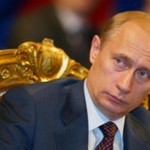MOSCOW - Russia will support a new global climate deal only if major powers also sign up and take into account the role Russia's giant forests play as the lungs of the world, Prime Minister Vladimir Putin said on Monday.
Putin, in his first extensive comments on the climate talks, said Russia was ready to support a deal to replace the Kyoto Protocol at next month's United Nations climate change conference in Copenhagen.
Russia, the world's number three emitter of greenhouse gases, is seen as a key player in the talks.
"Yes, we are ready to do this," Putin said when asked by a reporter if Russia would support a deal in Copenhagen.
"We will support the idea of Mr. Rasmussen to have a politically binding agreement at the end of the Copenhagen meeting," said Putin, who was speaking after talks in Moscow with Danish Prime Minister Lars Lokke Rasmussen.
Russia despite stepping down as Kremlin chief But Putin, who many diplomats and citizens believe is the true ruler to become prime minister in May 2008, said two conditions had to be met for Russia's support.
"All countries, especially those with the biggest emissions -- the world's major economies -- must sign this document without exception, otherwise it loses any logic," Putin said.
He added Moscow "will insist that the ability of Russia's forests to absorb carbon dioxide be taken into account".
WORLD'S LARGEST FORESTS
Russia has the largest forests in the world and says expanding forests means they help offset carbon dioxide emissions by other countries and should be taken into account when setting targets under a new deal.
"We've long known that Russia wants its forests included in a deal. But it's not provided satisfactory data on deforestation and on forestry management," said Bill Hare, of the Potsdam Institute for Climate Impact Research.
"Russia contends that the overall amounts of carbon in forests has increased since 1990," he said.
The United Nations says just a few degrees change in the world's climate could provoke floods, heatwaves, the extinction of animal species and the spread of diseases into new regions.
Rasmussen, speaking in an interview to Reuters, said he sees momentum for a deal next month and that he hoped to convince world leaders to attend the conference.
Russia's emissions are now more than 30 percent below 1990, the year before the Soviet Union fell, ushering in nearly a decade of economic collapse with emissions bottoming out during 1998.
Putin, who once quipped that a climate change could be positive as Russians would have to buy fewer fur coats, said that Russia was sticking to cutting greenhouse gas emissions to 30 percent below the 1990 level.
World Bank researchers say that under current forecasts for temperature change Russia's permafrost regions could partially melt and new pests could threaten the vast forests of Russia's north, though warmer temperatures could help increase crop yields.
According to the World Bank, one of the easiest ways for Russia to cut emissions would be to reduce the vast amount of energy -- equal to France's annual energy consumption -- it wastes for heating, electricity production and industry.
(For Reuters latest environment blogs click http://blogs.reu ters.com/environment)
The Copenhagen meeting is set to bring together 192 countries in an effort to negotiate a new global warming agreement for the period after 2012.
But diplomats say it is unlikely that a legally binding treaty can be agreed given divisions among the participants, notably between rich and developing countries over who should bear the main burden for emission cuts.
Rasmussen said he expected a political accord, rather than a legally binding treaty, to be adopted at the conference.
"I expect a politically binding agreement that will take effect right after the signature. This agreement will be the basis for a legally binding agreement," Rasmussen told reporters.




